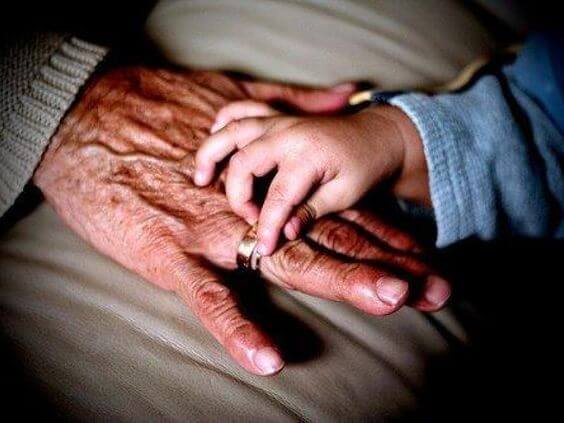What to Do if You're Not Allowed to See Your Grandchildren


Written and verified by the psychologist Maria Fátima Seppi Vinuales
Many times, the separation or divorce of a couple with children brings with it certain challenges and problems to be solved. For example, visitation, permissions, schedules, child support payments, and vacation dates, among other important issues. One of the most neglected problems has to do with the relationship with their grandparents. What can you do if you’re not allowed to see your grandchildren? Keep reading to find out.
Those who’ve had the chance to grow up with grandparents around report positive experiences and fond memories. Grandparents are like that parenthesis in everyday life. In that space, laughter, anecdotes, and experiences take place, away from the parental gaze.
Undoubtedly, the grandchild-grandparent relationship can be one of the most significant in the life of a child and of great transcendence for their development.

What are the benefits of the relationship between grandchildren and grandparents?
If the relationship is positive, both grandchildren and grandparents find satisfaction in the bond. For grandchildren, their grandparents’ presence is the possibility of accessing a new world, another era, new adventures, and discoveries, with limits that are a little more “relaxed” than when they’re with their parents.
For grandparents, it’s about revitalizing themselves, enjoying parenting from another place, with fewer responsibilities and greater enjoyment. Grandchildren also “update” their grandparents, bringing fresh ideas from their world and from the new generations.
Even for their own children, this relationship is positive, as grandparents can be a great source of help and collaboration.
You may be interested in: Children Who Grow Up With Their Grandparents Are Happier And More Secure
What to do if you’re not allowed to see your grandchildren
Many grandparents who aren’t allowed to see their grandchildren desperately seek to solve this problem. However, they don’t always know what to do. Some people recommend going through the courts and claiming their rights, but many grandparents fear the consequences of doing so. Let’s look at some of the possible alternatives.
Think about the cause of the conflict
The impossibility of being in contact with the grandchildren doesn’t always have the same origin. Sometimes it’s due to a difficulty with the son/daughter, with the child’s partner, or due to the death of the son or daughter, so that contact is prevented – or not encouraged – by the other parent.
Try to talk to the other person
Make an approach in order to agree on a visitation arrangement. It’s best to try to approach the conversation for the benefit of the grandchildren, to offer help, and to accompany the upbringing. Perhaps understanding or forgiveness between the adults isn’t achieved. But it does reduce the collateral damage.
Try to maintain contact with your grandchild as much as possible
You may not be allowed to see your grandchildren, but if they’re old enough and have their own cell phone, you can write to them to ask how they’re doing, how things are going in school, tell them about your activities, etc. It’s a way to be present and continue to foster the bond. Arranging a video call, at least once a week, can also be a good alternative.
Seek advice
When goodwill between adults isn’t enough, you can consider consulting a professional to learn about your rights and those of your grandchild. Depending on the country, before initiating a judicial approach, the option of mediation is offered.
This way, starting from the principle of dialogue and the search for solutions, a point of agreement can be found, as mentioned by Luisa Pérez Caballero and the other authors of the article published in the Revista Mediación.
Dialogue and intervention also allow you to reflect on a solution in the short term and is more in line with the reality of older adults, where time takes on another importance. A lawsuit can be prolonged in time and postpone the contact with the grandchild.
You may be interested in: What if Grandparents Don’t Agree with Your Child’s Upbringing?

Some points to take into account if you can’t see your grandchild
Depending on the country, the figures of other relatives are contemplated within the law. In other words, the respective Civil Codes recognize the importance of maintaining contact.
So, some keys to keep in mind are:
- Contact shouldn’t be prevented if there’s no just cause. For example, a contentious divorce between the parents isn’t a powerful argument for the grandparents not to be able to see their grandchildren.
- The interests of the child must be paramount. It’s important to listen to the child and give them room to express themself. If they wish to see their grandparents, their wishes must be respected.
- A visitation regime can be agreed upon. In general, the degrees of permissiveness correspond to other factors such as the child’s life circumstances and age, among other reasons.
Grandchildren first, beyond conflicts
Each family knows its own “internal situations.” For that reason, beyond the recommendations that friends or relatives can give you, it’s important to think about the reality that each person has to live with. Sometimes, what works in some cases, doesn’t work in others.
What’s always important, for the benefit of the children, is to try to find a solution in a peaceful way.
Finally, it’s also valuable to know that if you want to maintain a relationship with your grandchild, it’s best that it’s stable and consistent. That is, there may be difficulties, but it’s not about “showing up and disappearing” whenever you feel like it or have the time. This can be very painful for the grandchild, who won’t feel secure in the bond because there’s no predictability.
Many times, the separation or divorce of a couple with children brings with it certain challenges and problems to be solved. For example, visitation, permissions, schedules, child support payments, and vacation dates, among other important issues. One of the most neglected problems has to do with the relationship with their grandparents. What can you do if you’re not allowed to see your grandchildren? Keep reading to find out.
Those who’ve had the chance to grow up with grandparents around report positive experiences and fond memories. Grandparents are like that parenthesis in everyday life. In that space, laughter, anecdotes, and experiences take place, away from the parental gaze.
Undoubtedly, the grandchild-grandparent relationship can be one of the most significant in the life of a child and of great transcendence for their development.

What are the benefits of the relationship between grandchildren and grandparents?
If the relationship is positive, both grandchildren and grandparents find satisfaction in the bond. For grandchildren, their grandparents’ presence is the possibility of accessing a new world, another era, new adventures, and discoveries, with limits that are a little more “relaxed” than when they’re with their parents.
For grandparents, it’s about revitalizing themselves, enjoying parenting from another place, with fewer responsibilities and greater enjoyment. Grandchildren also “update” their grandparents, bringing fresh ideas from their world and from the new generations.
Even for their own children, this relationship is positive, as grandparents can be a great source of help and collaboration.
You may be interested in: Children Who Grow Up With Their Grandparents Are Happier And More Secure
What to do if you’re not allowed to see your grandchildren
Many grandparents who aren’t allowed to see their grandchildren desperately seek to solve this problem. However, they don’t always know what to do. Some people recommend going through the courts and claiming their rights, but many grandparents fear the consequences of doing so. Let’s look at some of the possible alternatives.
Think about the cause of the conflict
The impossibility of being in contact with the grandchildren doesn’t always have the same origin. Sometimes it’s due to a difficulty with the son/daughter, with the child’s partner, or due to the death of the son or daughter, so that contact is prevented – or not encouraged – by the other parent.
Try to talk to the other person
Make an approach in order to agree on a visitation arrangement. It’s best to try to approach the conversation for the benefit of the grandchildren, to offer help, and to accompany the upbringing. Perhaps understanding or forgiveness between the adults isn’t achieved. But it does reduce the collateral damage.
Try to maintain contact with your grandchild as much as possible
You may not be allowed to see your grandchildren, but if they’re old enough and have their own cell phone, you can write to them to ask how they’re doing, how things are going in school, tell them about your activities, etc. It’s a way to be present and continue to foster the bond. Arranging a video call, at least once a week, can also be a good alternative.
Seek advice
When goodwill between adults isn’t enough, you can consider consulting a professional to learn about your rights and those of your grandchild. Depending on the country, before initiating a judicial approach, the option of mediation is offered.
This way, starting from the principle of dialogue and the search for solutions, a point of agreement can be found, as mentioned by Luisa Pérez Caballero and the other authors of the article published in the Revista Mediación.
Dialogue and intervention also allow you to reflect on a solution in the short term and is more in line with the reality of older adults, where time takes on another importance. A lawsuit can be prolonged in time and postpone the contact with the grandchild.
You may be interested in: What if Grandparents Don’t Agree with Your Child’s Upbringing?

Some points to take into account if you can’t see your grandchild
Depending on the country, the figures of other relatives are contemplated within the law. In other words, the respective Civil Codes recognize the importance of maintaining contact.
So, some keys to keep in mind are:
- Contact shouldn’t be prevented if there’s no just cause. For example, a contentious divorce between the parents isn’t a powerful argument for the grandparents not to be able to see their grandchildren.
- The interests of the child must be paramount. It’s important to listen to the child and give them room to express themself. If they wish to see their grandparents, their wishes must be respected.
- A visitation regime can be agreed upon. In general, the degrees of permissiveness correspond to other factors such as the child’s life circumstances and age, among other reasons.
Grandchildren first, beyond conflicts
Each family knows its own “internal situations.” For that reason, beyond the recommendations that friends or relatives can give you, it’s important to think about the reality that each person has to live with. Sometimes, what works in some cases, doesn’t work in others.
What’s always important, for the benefit of the children, is to try to find a solution in a peaceful way.
Finally, it’s also valuable to know that if you want to maintain a relationship with your grandchild, it’s best that it’s stable and consistent. That is, there may be difficulties, but it’s not about “showing up and disappearing” whenever you feel like it or have the time. This can be very painful for the grandchild, who won’t feel secure in the bond because there’s no predictability.
All cited sources were thoroughly reviewed by our team to ensure their quality, reliability, currency, and validity. The bibliography of this article was considered reliable and of academic or scientific accuracy.
- González Bernal, Jerónimo J.; González Santos, Josefa; Ortiz Oria, Vicente; González Bernal, Enrique
LA RELACIÓN ABUELOS-NIETOS DESDE UNA PERSPECTIVA INTERCULTURAL
International Journal of Developmental and Educational Psychology, vol. 2, núm. 1, 2010, pp. 669-676
Asociación Nacional de Psicología Evolutiva y Educativa de la Infancia, Adolescencia y Mayores
Badajoz, España. - Pérez Caballero, Mª Luisa, Acevedo Bermejo, Antonio y Muñoz Vicente, José Manuel. (2012). Los conflictos parentales como origen de las dificultades en las relaciones abuelos-nietos abordaje mediacional y jurídico-forense. Revista de Mediación. Año 5. Nº 9. 1er semestre 2012.
This text is provided for informational purposes only and does not replace consultation with a professional. If in doubt, consult your specialist.








